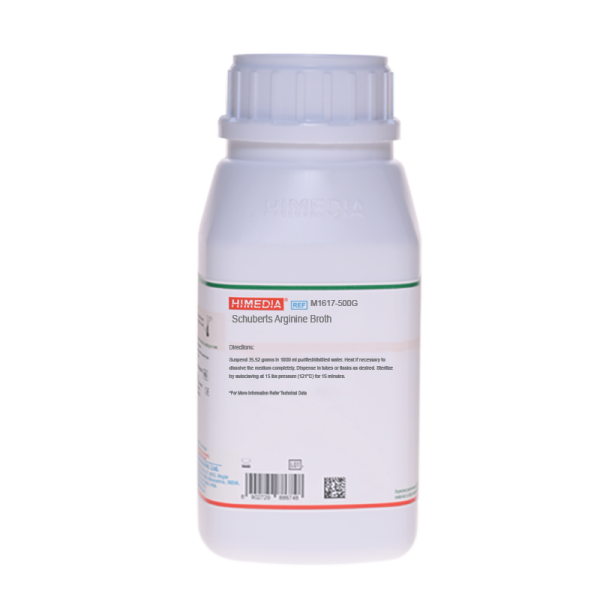 Your enquiry has been submitted
Your enquiry has been submitted
Schuberts Arginine Broth
Schuberts Arginine Broth is used as an enrichment broth for testing swimming pool water for isolation of chlorine damaged Pseudomonas aeruginosa.
Composition**
| Ingredients | Gms / Litre |
|---|---|
| Casein enzymic hydrolysate | 17.000 |
| Soya peptone | 3.000 |
| D-Glucose | 0.500 |
| Sodium chloride | 5.000 |
| L-Arginine monohydrochloride | 10.000 |
| Bromothymol blue | 0.0075 |
| Cresol red | 0.010 |
| Brilliant green | 0.00038 |
Final pH ( at 25°C): 7.0±0.2
**Formula adjusted, standardized to suit performance parameters
Directions
Suspend 35.52 grams in 1000 ml distilled water. Heat if necessary to dissolve the medium completely. Mix well and dispense into sterile tubes or flasks as desired. Sterilize by autoclaving at 15 lbs pressure (121°C) for 15 minutes.
Principle And Interpretation
Swimming pool is a body of water of limited size contained in a holding structure. Indicators of health risk in swimming pools include normal skin flora that are shed, such as Pseudomonas and Staphylococcus (1, 2). However these bacteria may be stressed or injured due to chlorination. These injured bacteria are incapable of growth and colony formation under standard conditions because of structural or metabolic changes (3).
Schuberts Arginine Broth is used as an enrichment medium for chlorine-stressed Pseudomonas aeruginosa strains (4). Schuberts Arginine Broth, formulated by Schuberts (5), utilizes the fact that with arginine, P. aeruginosa produces a strongly alkaline reaction resulting in an easily identifiable colour change from grey-green to blue-violet. The indicators used for this purpose are bromothymol blue and cresol red. The medium may be used with either the membrane filter or the liquid enrichment technique.
Casein enzymic hydrolysate and soya peptone serve as rich sources of carbon, nitrogen and essential growth nutrients. Glucose is the energy source. Brilliant-green inhibits the accompanying gram-positive flora while having no toxic effect on pre-stressed P. aeruginosa. A color change from grey-green to blue-violet indicates the presence of P. aeruginosa allowing presumptive detection of P. aeruginosa.
Quality Control
Appearance Light yellow to light blue homogeneous free flowing powder
Colour and Clarity of prepared medium Grey green coloured clear solution in tubes
Reaction Reaction of 3.55% w/v aqueous solution at 25°C. pH : 7.0±0.2
pH 6.80-7.20
Cultural Response
M1617: Cultural characteristics observed after an incubation at 35-37°C for 24-48 hours.
| Organism | Inoculum (CFU) | Growth (Plain) | Colour change to violet |
|---|---|---|---|
| Pseudomonas aeruginosa ATCC 27853 | 50-100 | good-luxuriant | positive reaction |
| Pseudomonas aeruginosa ATCC 9027 | 50-100 | good-luxuriant | positive reaction |
| Pseudomonas stutzeri ATCC 17832 | 50-100 | None-poor | negative reaction |
| Aeromonas hydrophila ATCC 7966 | 50-100 | good-luxuriant | positive reaction |
| Enterococcus faecalis ATCC 19433 | 50-100 | fair-good | negative reaction |
| Escherichia coli ATCC 25922 | 50-100 | good-luxuriant | variable reaction |
Storage and Shelf Life
Store below 30°C in tightly closed container and the prepared medium at 2-8°C. Use before expiry date on the label.
Reference
- Seyfried P. L., Tobin R. S., Brown N. E. and Ness P. F., 1985, Am. J. Pub. Health 75 : 1071
- Klapes N. A. and Vesley D., 1988, Appl. Environ. Microbiol. 52 : 589
- Eaton A. D., Clesceri L. S. and Greenberg A. E. (Ed.), 1998, Standard Methods for the Examination of Water and Wastewater, 20th Ed., American Public Health Association, Washington, D.C.
- DIN 38411, Part 8, May 1982, Nachweis Van Pseudomonas aeruginosa.
- Schubert, R., 1989, Zbl. Bakt. Hyg. B 187; 266-268.
| Product Name | Schuberts Arginine Broth |
|---|---|
| SKU | M1617 |
| Customized Product Available | No |



